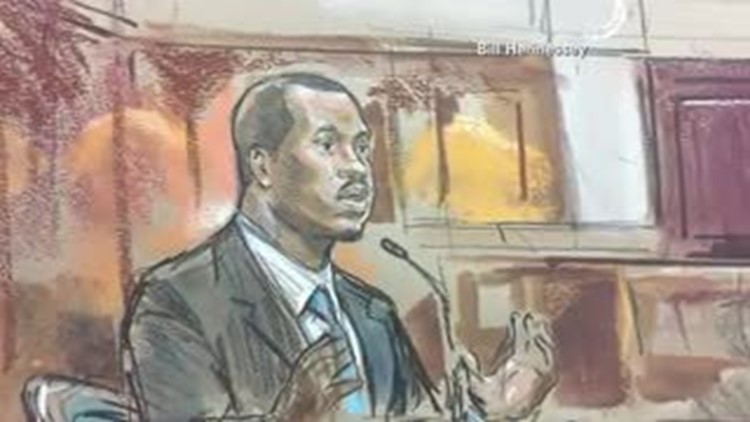BALTIMORE, Maryland (CNN) — After calling to the stand the mother of William Porter — the first of six Baltimore police officers to be tried for the death of Freddie Gray — Porter’s defense team rested its case Friday.
The jury has been dismissed until Monday.
Helena Porter, a nursing assistant, described her son as “a nice (and) honest guy” while testifying briefly Friday.
“He likes to keep the peace,” she added. “He’s the peacemaker.”
These sentiments were echoed by several other character witnesses, such as Angela Gibson, who said that her friend Porter is “always very truthful and kind” and “cares about people.”
In a similar light, Rena Somerville described Porter as “like a grandson to me” and characterized him as “very honest” and “a giver.” And Devon Scott called his close friend a “truthful” and “peaceful” person.
Baltimore police Capt. Justin Reynolds also testified for the defense, explaining that the “transporting officer” is responsible for those taken into custody. Porter was not the transporting officer in Gray’s case.
Reynolds, who is currently on medical leave from the Baltimore police, also said that more than 1,700 pages of general orders were issued shortly before Gray’s April death. The only way to verify an officer knew of these orders — parts of which referred to the transportation of detainees — is if they are read aloud at roll call, according to the police captain.
Reynolds, who was assigned to the police academy and helped draft department policy, said the orders allow “the exercise of good judgment” in policing but are meant as guidelines to be used with discretion.
“You have to use common sense,” he said. “It prevails over everything else.”
When Porter helped Gray onto a bench in the wagon during one of the stops that April day, he did more than he was required to do, according to Reynolds.
“He went beyond what he could have and still kept within the policy,” Reynolds testified.
Porter, 26, has said that Gray was kicking the inside of the police van en route to the station, and he had tried to kick out the window of a patrol car during an arrest a few weeks earlier.
Report finds gaps in unrest preparedness
Authorities say Gray broke his neck April 12 while being transported in a police van, shackled but not wearing a seat belt. He died a week later.
His death sparked outrage and demonstrations, some of which were plagued by arson, vandalism and looting, despite his family’s pleas for peace.
An independent report by researchers at Johns Hopkins University released Friday cited gaps in Baltimore’s preparedness for the unrest.
The researchers made recommendations similar to those in an earlier report, including the development of policies for mass demonstrations and improved intelligence gathering, according to a statement from Mayor Stephanie Rawlings-Blake. Many of the recommendations have already been implemented.
Porter testified Wednesday
Porter has pleaded not guilty to charges of involuntary manslaughter, second-degree assault, misconduct in office and reckless endangerment.
During his four-hour testimony Wednesday, Porter contended that of the roughly 150 prisoners he has placed in a police wagon since joining the Baltimore Police Department in 2010, none was secured with a seat belt — in part, out of concern for officers’ safety while in the wagon’s tight quarters.
Prisoners were never secured with seat belts during field training, and though cadets were instructed to secure prisoners with seat belts, they were not shown how, Porter said.
“It is the responsibility of the wagon driver to get the prisoner from point A to point B,” he told the jury.
Prosecutors allege that Gray didn’t get the medical help he asked for during one stop of the van. An autopsy showed his spinal column was “functionally” severed. The cause of his death was a neck injury, and the manner of his death was homicide, a medical examiner testified last week.
Porter has testified that Gray didn’t ask to be transported to the hospital until the fourth of six stops along the 45-minute ride to the police station. Porter relayed the information to the driver, he testified Wednesday, but he didn’t call a medic because Gray didn’t appear injured and didn’t articulate what was wrong.



